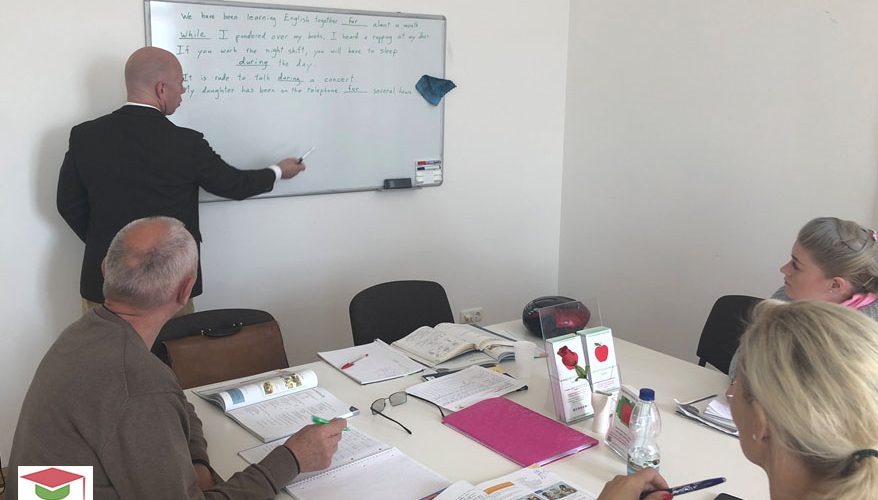Prepositions which need the Accusative
Explaining the correct case to use with a preposition is one of the most difficult lessons in a German course. German grammar uses one of the four cases in connection with a certain preposition to form sentences. To help you navigate this ‘Preposition Jungle’ with slightly more ease, you will find various preposition exercises which use the Accusative.
The following prepositions will be practiced in this blog post: bis, durch, für, gegen, ohne, um, à, je, pro, per, wider, betreffend, entlang.
Preposition ‘bis’
The preposition ‘bis’ can be used like an adverb to relate to places and time.
Examples:
- Der Zug fährt bis Wien – The train goes to Vienna (relating to place)
- Die Veranstaltung dauert bis 18 Uhr – The event lasts until 6 o‘clock (relating to time)
- Auf Wiederschauen, bis bald – Goodbye, until soon (Adverb)
Preposition ‘durch’
This preposition relates to time and places.
Examples:
- Zum Bahnhof must du durch den Park gehen – To get to the station you have to go through the park (relating to place, direction)
- Durch häufiges Trinken von Alkohol wird die Merkfähigkeit gemindert – Through heavy drinking of alcohol, memory is decreased (passive)
Preposition ‘für’
‘Für’ can be used to convey specific information, such as a space of time or a price.
Examples:
- Meine Frau ist für eine Woche nach Italien verreist – My wife travelled to Italy for a week (period of time)
- Die Wohnung wurde für 300.000 Euro verkauft – The apartment was bought for 300,000 Euros (price)
Preposition ‘gegen’
The preposition ‘gegen’ is used relating to a movement, as well as approximate numbers/figures and times.
Examples:
- Heute ist meine Tochter mit dem Fahrrad gegen einen Zaun gefahren – Today my daughter drove into a fence with her bike (movement with contact)
- Frau Gruber wird gegen 13 Uhr wieder im Büro sein – Mrs Gruber will be back in the office at around one o’clock (approximate timing)
- Die Wohnung müsste gegen 300.000 Euro kosten – The apartment should cost around 300,000 Euros (approximate price)
Preopsition ‘ohne’
‘Ohne’ is used to indicate the opposite.
Examples:
- Mein Sohn machte sich ohne Essen in seinem Rucksack auf die Wanderung – My son went for a walk without food in his backpack
- Herr Müller wird ohne seine Frau zum Essen kommen – Mr Müller will come to eat without his wife
- Ohne meine Zigaretten geht es mir nicht gut – I am not well without my cigarettes
Preposition ‘um’
This preposition is used in connection to information relating to numerical information as well as places and times.
Examples:
- Das Rathaus sehen Sie, wenn Sie um die nächste Ecke biegen – You will see the town hall when you go around the next corner (relating to place/direction)
- Ich habe bereits um 7 Uhr einen Arzttermin – I already have a doctor’s appointment at seven o’clock (time related)
- Der Ölpreis könnte nächstes Jahr um mehrere Prozent steigen – The price of oil could rise by several percent next year (numerical)
In addition to these prepositions, there are a few more which take the Accusative!
Prepositions ‘à, je, pro, per’
These prepositions are used, for example, to talk about units of measure.
Examples:
- Ich möchte vier Säcke Äpfel à fünf Kilo – I would like four bags of apples at five kilos
- Die Trauben kosten fünf Euro je Kilo – The grapes kost five Euros for each kilo
- Die Tomaten kosten zehn Euro pro Kilo – The tomatoes cost ten Euros per kilo
- Ich möchte gerne per Kreditkarte bezahlen – I would like to pay by credit card
Preposition ‘wider’
The preposition ‘wider’ is an old form of ‘gegen’ and is nowadays only used in certain situations.
Examples:
- Wider besseres Wissen wurden die Sicherheitsvorkehrungen nicht verbessert – Against better judgement, the safety precautions were not improved
- Wider alle Erwartungen gewann Österreich die Fußball-Europameisterschaft – Despite the expectations, Austria won the European football championship
- Wider alle Prognose trat der Präsident zu einer zweiten Amtszeit an – Against all the advice, the president ran for a second term of office
Preposition ‘betreffend’
This preposition is used especially in written communication – regarding, concerning, in question, concerned, respective, relevant
Examples:
- Ihr Schreiben vom 1. Dezember betreffend möchte ich wie folgt beantworten – I would like to answer you concerning your writing from the 1st December
- Betreffend Ihre E-Mail vom 1. Dezember möchte ich folgende Angaben machen – With regards to your email from the 1st December, I would like to give you the following information
Preposition ‘entlang’
This is probably the most difficult preposition, because it can be used as a preposition (preceding) and as preposition (following), and also changes the case. As a preposition, ‘entlang’ takes the Genitive, and as a preposition it uses the Accusative.
Examples:
- Den Fluss entlang stehen viele prächtige Burgen und Klöster – Along the river are many impressive castles and monastries (preposition with Accusative)
- Entlang des Flusses stehen viele prächtige Burgen und Klöster – preposition with Genitive













